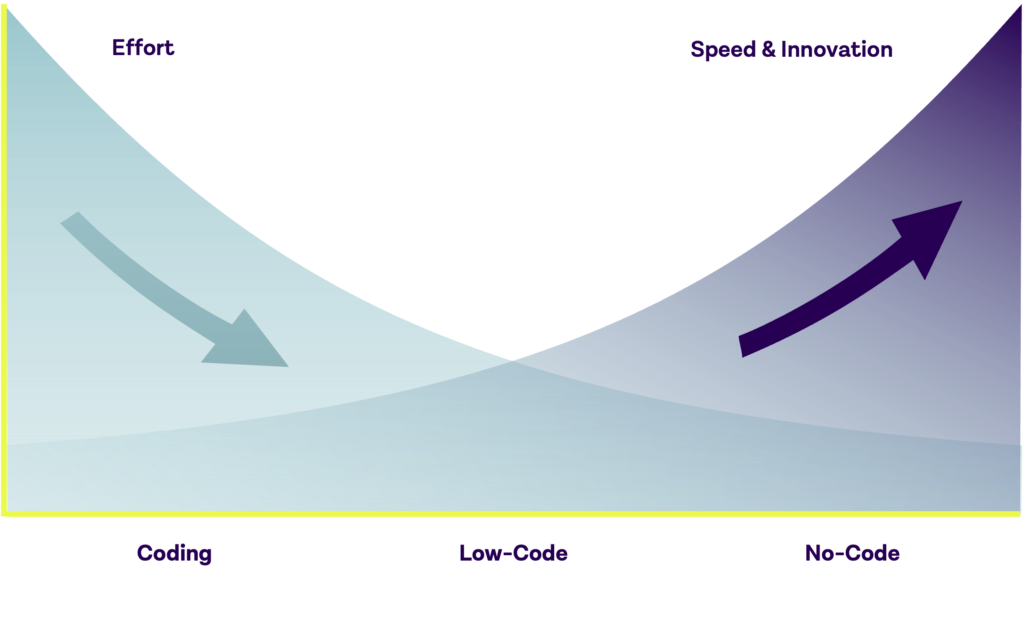B2B businesses need to become software companies. But how?
In today’s digital society, companies are feeling the pressure to innovate in order to stay relevant. But rising business complexity and increasingly scarce IT resources are slowing down business innovation globally.
The changing face of digital transformation
The digital transformation of businesses is nothing new. In the past two decades, companies have become increasingly “digitised.” This has included everything from going paperless to automating workflows.

Three main factors are accelerating this digital transformation:
- Increasing business complexity – Global value chains are being further broken up into niches, yet there is an increasing push for cross-chain integration.
- Increasing customer demand for convenience – Following B2C trends, more B2B solutions strive for the “lot size one” experience.
- Increasing cost pressure for the business themselves – Standardisation, price transparency, and market saturation exacerbate businesses’ cost pressure.
But as these trends overlap, they present present a growing challenge for today’s businesses: They must prepare for shifting economic trends, while staying relevant to their target customer.
It’s not enough for a business to merely optimise internal efficiencies through digitisation — To remain competitive in this increasingly complex environment, companies must generate new revenue streams by creating new digital software solutions. Such a transition allows B2B companies to standardise and automate their most routine tasks, while freeing up limited resources for value-generating activities.
How does a B2B company go “digital”?
Transitioning to a company whose main products are digital is no small feat.
First, companies need to have a strong vision for what their digital solution will look like. What problem is it solving? Who is it for? How we will make money off of it?
For industries that have traditionally centred around human capital and expert knowledge — such as healthcare, law, and finance — businesses will need to figure out how to translate their expertise into a marketable software product. However, this can be complicated because, for many professions, knowledge sharing has traditionally been counter-cultural.
In other industries, where market players have traditionally worked alone, businesses will need to decide how to come together to collectively address the end-to-end needs of consumers. Take, for example, an electronics vendor and insurance provider working together to provide easy-to-buy warranty packages. Such cross-business and even cross-sector collaborations will become more prominent as consumers demand more integrated experiences.

Once companies have a strong product vision, they will need to develop their solution with an internal IT team or external agency. But this isn’t such a cut-and-dried step in a company’s digital journey. Anybody who is familiar with software development will know that building custom B2B software is costly, time-consuming, and unpredictable.
The cost and duration of traditional software development projects will depend on the project’s requirements. For instance, building a simple mobile app could cost around $50,000 and take about a month. On the other end of the spectrum, a larger project with complex business logic could cost hundreds of millions of dollars and take months, even years.
Moreover, Mckinsey estimates that 66% of software projects run over schedule, while 33% run over budget.
The uncertainties and risks around traditional software development can discourage businesses from pursuing innovation plans or lead them to defer their plans until it’s too late.
Luckily for companies eager to embrace digital innovation, software development is being transformed by the no-code movement.
How no-code is transforming software development
Because no code development allows users to create applications using visual tools, it opens up a whole new world of software development and product innovation. Everyone from individuals with no coding skills to professional developers can use no code tools and platforms. This democratisation of software development is a critical advantage as global IT talent becomes increasingly scarce.
The speed and simplicity of no-code development make it an attractive alternative to traditional software development. The market for no-code platforms is expected to grow by over 30% each year. Gartner predicts that by 2025, 70% of new applications developed by organisations will use low-code or no-code.

However, most of the no-code market caters to internal tooling and efficiency gains; there is a vast gap in serving users who want to build and sell SaaS products. That’s why Inventify has established a whole new category in the no-code market: B2B2B Enterprise Plaform.
The future of codeless innovation
Our cloud-based, industry-agnostic platform empowers businesses to use their expert knowledge to build innovative, end-to-end digital solutions for their customers.
To accelerate the success of our customers, we provide built-in features that serve the most common needs of a B2B business, including:
- Two-factor authentication
- Data encryption
- Single sign-on
- White-labelling
- And more
Custom solutions are assembled from smaller building blocks in fast iterations. Any missing blocks can be delivered as custom extensions.
Inventify unlocks a better way for B2B businesses to bring their ideas to market faster and cheaper. To learn more about how your company could benefit from Inventiy’s approach, please send a message to: info@inventify.com.